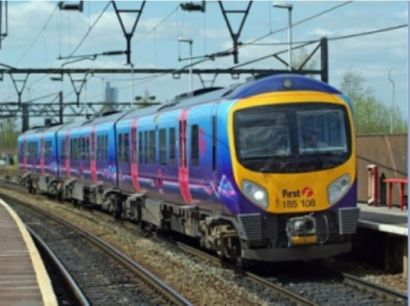Updated: 30/09/2015 17:58
NEWS of the government’s announcement that work on the ‘paused’ North Trans-Pennine and Midland Main Line electrification schemes is to resume has been greeted with some dismay – because completion will be delayed by around four years
The Department for Transport made the announcement ahead of next week’s Conservative Party conference in Manchester, which crucially is one of the cities at the heart of Chancellor George Osborne’s ‘Northern Powerhouse’ plans.
The DfT’s statement was carefully worded, but it was clear that completion of both projects – which were ‘paused’ by Transport Secretary Patrick McLoughlin, in June due to soaring costs and delays to Network Rail’s big programme of enhancements – will be delayed by around four years.
While the statement suggested that Midland Main Line electrification would be concluded only to Kettering and Corby by 2019 and not to Sheffield, via Leicester, Nottingham Derby, until 2023, it was not at all clear whether North Trans-Pennine electrification will actually be completed by 2022 – as a letter from Network Rail’s new chairman Sir Peter Hendy to Patrick McLoughlin only stated that, if his advice was followed, it “could” result in delivery of NTP electrification “by the end of 2022.”
Mary Creagh, former Labour shadow transport minister and MP for Wakefield, was one of the first to attack the DfT’s announcement with a tweet saying: “Rail u-turn shows chaos at the heart of govt. Rushed out before Hendy review completed to spare Osborne blushes at Tory conference in Manchester.”
The new Shadow Transport Secretary Lilian Greenwood added: “It's disappointing that these projects will be delivered years late, holding back the economies of the Midlands and the North while schemes in other regions go ahead as planned.”
Ed Cox, director of the think-tank IPPR North, said the delays had been a “setback for the credibility” of the Government's ‘Northern Powerhouse’.
The original plan for the NORTHERN TRANS-PENNINE route was to complete electrification eastwards from Stalybridge through the Pennines into Yorkshire by the end of 2018.
In a letter to Patrick McLoughlin, Sir Peter Hendy notably made clear Network Rail had NOT paused “significant interventions in the route to improve journey times and speed, and this will continue.”
“However,” Sir Peter explained, “in order to ensure expenditure is not wasted on abortive works, my advice is that a full planning exercise should start immediately with the relevant parties – Network Rail, Department for Transport and Transport for the North – involved.
“This will establish a firm detailed design which increases benefits to passengers compared to the previous paused scheme, and this will be concluded by the end of 2017.
“During this time we should also explore the best methods of delivery on the Trans-Pennine route, nearing in mind the need to keep the railway operational, but also the need for necessary access to the railway for the works.
“My advice is that commencing electrification at the beginning of 2018 (with some enabling works carried out before then) could result in delivery by the end of 2022.”
The DfT’s statement, however, did not include reference to “electrification” but spoke instead of “the upgrade” which it said is “expected to provide capacity for six fast or semi-fast trains per hour, take up to 15 minutes off today’s journey time between Manchester and York and be complete by 2022.”
Upgrading of the route – with, for example, some additional tracks and realignments for higher speeds – would provide permit capacity and reduced journey times even without electrification being completed. This will now be a major issue for bidders for the next Northern and Trans-Pennine Express franchises, which are due to be announced in December, who must decide what type of trains they would propose to deploy, and when.
DfT added, but without mentioning any end date: “When the work is finished, the whole route from Liverpool to Newcastle (via Manchester, Leeds and York) will be fully electrified and journey times will be significantly reduced compared to today’s railway.”
On the MIDLAND MAIN LINE, the wires will not now reach Kettering and Corby until 2019, whereas the original plan had been for electrification to stretch to Derby, Leicester and Nottingham by then.
Sir Peter Hendy said “the line north of Kettering to Derby/Nottingham and Sheffield can be electrified in stages by 2023.”
The DfT concluded by stating: “The total programme of rail electrification and upgrades will completely transform the railways for passengers in the North and Midlands and help ensure that every part of Britain benefits from a growing economy.
Transport Secretary McLoughlin commented: “As a ‘one nation’ Government we are making sure every part of Britain benefits from a growing economy.
“Connecting up the great cities of the North is at the heart of our plan to build a Northern Powerhouse. This Government will see the job through and build a better, faster and more reliable railway for passengers in the North and Midlands.”
Network Rail’s Sir Peter Hendy said: “The temporary pause in the programme has given us the space to develop a better plan for passengers. People can expect more services and faster journeys.”
But he added: “We face some difficult challenges, and there is more work still to do.”


